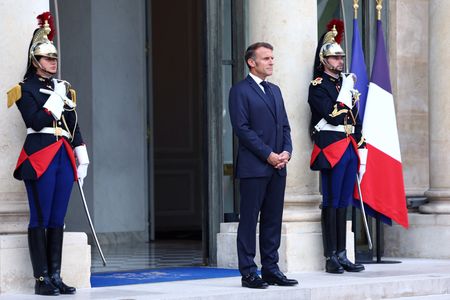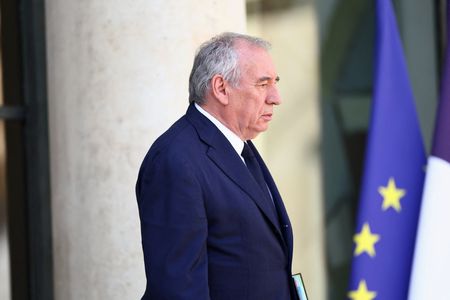By Tassilo Hummel and Elizabeth Pineau
PARIS (Reuters) -The French prime minister’s decision to hold a confidence vote next month carries heavy risks for the economy, bringing back fears of recession, business leaders said on Wednesday.
Opposition parties have said they will bring down the minority government in the September 8 vote which Prime Minister Francois Bayrou unexpectedly announced on Monday, throwing the euro zone’s second economy back into crisis.
Opinion polls carried out after Bayrou’s announcement show most French people now want new national elections, pointing to deepening dissatisfaction with politics and a risk of lasting uncertainty.
“Our morale is tied to the functioning of the state,” said Alexandre Bompard, CEO of the country’s largest retailer, Carrefour.
“The more uncertainty there is, as is the case right now, the higher the risk of a strong hit on the economy as consumers postpone their spending decisions,” Bompard told a business conference.
The French economy grew 0.3% in the second quarter, thanks to a rebound in household spending. “Only consumption is sustaining growth,” Bompard said. “This has created a recessionary risk.”
Earlier, Patrick Martin, head of the Medef employers’ group, told the conference he was “appalled” that French politicians could not overcome their differences.
“Those who think they can play with the economy make us face a huge risk,” he said.
Bayrou called the confidence vote in a bid to get ahead of a likely no-confidence vote the opposition was preparing to table later in the year over his plans for a budget squeeze in 2026.
That immediately backfired, with opposition parties saying they would vote him out. While they agree France’s deficit and debt are too high, the opposition disagree with him on how to tackle the problem and refuse to back him.
NEW ELECTIONS?
Macron, whose term runs until 2027, has repeatedly ruled out resigning or calling new parliamentary elections and, though he has not publicly commented on either since Monday, he seems more likely to replace Bayrou with a new prime minister.
However, a vast majority of French people want parliament dissolved for another vote, separate surveys by the Ifop, Elabe and Toluna Harris Interactive pollsters showed, with rates varying between 56% and 69%.
The Toluna Harris Interactive poll for RTL showed 41% would want the anti-immigration, far-right National Rally to lead the next government – the highest score for any party, though 59% were against having an RN prime minister.
The second-highest score, at 38%, was for a non-career politician to take the role.
Meanwhile, the Elabe poll for BFM TV showed 67% wanted Macron to resign if Bayrou loses the confidence vote. The Ifop poll for LCI showed a similar result.
Macron did not discuss the option of dissolving parliament during a weekly cabinet meeting on Wednesday, government spokeswoman Sophie Primas said.
Instead, he backed Bayrou’s strategy, she said.
Centrist Bayrou is trying to tame debt that has risen to 113.9% of GDP and a deficit that was nearly double the EU’s 3% limit last year. He has proposed a 44 billion euro budget squeeze that would include scrapping two public holidays and freezing most public spending.
But his announcement triggered a steep market selloff, narrowing the gap between French and Italian 10-year bond yields.
“We want to stress that, in any case, both scenarios (i.e. new PM or snap elections) would likely mean a prolonged period of uncertainty,” Morgan Stanley analysts wrote in a note.
Then a political outsider, Macron was first elected in 2017 on promises to break the right-left divide and modernise France with growth-friendly tax cuts and reforms.
Successive crises – including protests, COVID-19 and runaway inflation – have shown he has failed to change the country’s overspending habit.
More protests have been called for September 10, two days after the confidence vote, by various groups with disparate aims on social media and backed by leftist parties and some unions.
(Additional reporting by Dominique Vidalon, Sudip Kar-Gupta, Michel Rose, Makini Brice; Writing by Ingrid Melander; Editing by Toby Chopra, Alison Williams and Aidan Lewis)












